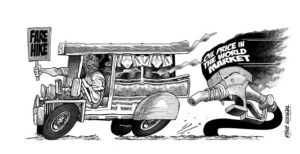
P10 may not be much for Presidential Spokesman Salvador Panelo and the incumbent administration and sure, there are commuters across the country who pay more for going to and from their homes to their offices and schools and vice versa.
But try multiplying that fare for a week for even an average household that makes the bare minimum wage and even that is a serious dent on the budget that is already burdened by high prices on rice and other basic commodities.
“While we commiserate with the riding public as they endure another round of fare hikes, we appeal for the understanding of the citizenry as the government has no choice but to allow the increase due to soaring prices of oil in the global market. The message of all this, ‘this is just temporary.’ So hopefully when everything settles down, we’ll go back to normal,” Panelo told reporters.
What actually exacerbated the fare increases in the first place isn’t the global oil prices which rise and fall on a regular basis but the excise tax imposed on fuel during the first phase of the government’s Tax Reform Acceleration and Inclusion (TRAIN) law.
That’s why regardless of the fluctuations in global oil prices — unless a major upheaval occurs which is out of the government’s control — fuel prices in the country won’t lower to a level significant enough to warrant a fare rate rollback which is somewhat deliberate and slow to come for commuters compared to fare rate increases.
In fact, public utility vehicle (PUV) operators were slow in moving for a fare rate rollback even with a spate of fuel price discounts given by oil companies in the pre-TRAIN era.
And as reported by the Philippine Daily Inquirer, the National Economic Development Authority (NEDA) opposed the fare rate increase, even calling on the Land Transportation Franchising and Regulatory Board (LTFRB) to find other alternative measures to cushion the impact of the fuel price increase.
These included but is not limited to expediting the allocation of the fuel subsidy program for passenger jeepney operators and to partner with oil companies to give fuel discounts to PUV drivers.
The fare rate increases were imposed in Luzon recently and it’s only a matter of time before the LTFRB decides on the petitions for fare rate increases for Cebu’s PUV operators.
Again, we ask: Does the riding public benefit at all from both the fuel subsidy program and the fare rate increase given to PUV operators? As things stand, the commuters are being screwed out of their hard-earned money by both the government and the operators.

